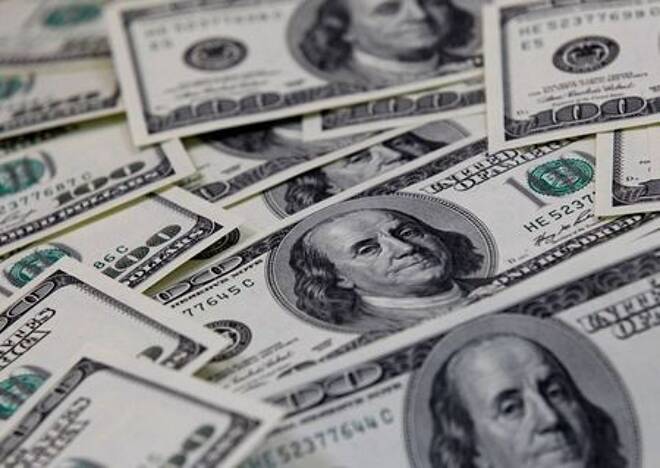Advertisement
Advertisement
Dollar Falters After U.S. Inflation Rise Eases, Safe-Haven Yen, Franc Up
By:
NEW YORK (Reuters) -The dollar fell against major currencies on Tuesday after data showed a less-than-expected rise in U.S. inflation last month, creating uncertainty about the timing of the Federal Reserve's tapering of asset purchases.
Several Fed officials have suggested the U.S. central bank could reduce its buying of debt securities by the end of the year, but said an eventual interest rate hike would not happen for some time.
The Fed will hold a two-day monetary policy meeting next week, with investors keen to find out whether a tapering announcement will be made.
Tapering tends to benefit the dollar as it suggests the Fed is one step closer toward tighter monetary policy. It also means the central bank will be buying fewer debt assets, effectively reducing the number of dollars in circulation.
Data on Tuesday showing the U.S. consumer price index, excluding the volatile food and energy components, edged up just 0.1% last month has raised doubts about tapering this year, some analysts said.
August’s core CPI rise was also the smallest gain since February and followed a 0.3% rise in July. The so-called core CPI increased 4.0% on a year-on-year basis after gaining 4.3% in July.
“The softer inflation prints caused investors to push back on bets that the Fed could move sooner to taper bond purchases. Easing inflation would take the heat off the Fed to move prematurely,” said Fiona Cincotta, senior financial markets analyst at City Index.
She also cited U.S. core producer prices (PPI) data for August released last week, which also rose at a slower pace. Excluding the food, energy and trade services elements, producer prices rose 0.3% last month, the smallest gain since last November. The so-called core PPI shot up 0.9% in July.
“So the evidence does appear to be building that peak inflation has passed. That said, supply chain bottlenecks are expected to persist for a while so it’s unlikely that either PPI or CPI will drop dramatically or rapidly,” Cincotta added.
In afternoon trading, the dollar index was slightly down at 92.601, moving away from a more than a two-week high on Monday.
The euro was flat against the dollar at $1.1807.
Risk appetite soured on Tuesday as well, with Wall Street shares down while U.S. Treasury prices were up sharply, pushing yields lower.
Investors looked past decelerating inflation and focused on uncertainties about U.S. growth now clouded by the economic impact of the Delta variant.
Against the safe-haven Swiss franc, the dollar dropped 0.4% to 0.9189 francs.
Versus another safe-haven, the Japanese yen, the dollar fell 0.4% to 109.615 ye
In other currencies, the Australian dollar fell to a two-week low after Reserve Bank of Australia Governor Philip Lowe painted a very dovish policy outlook with no rate hikes on the horizon until 2024.
The Aussie dollar was last down 0.7% at US$0.7319. In cryptocurrencies, bitcoin was last up 3.1% at $46,400 . Ether changed hands at $3,344, up 1.9%.
For a look at all of today’s economic events, check out our economic calendar.
(Reporting by Gertrude Chavez-Dreyfuss in New York; Additional reporting by Saikat Chatterjee in London and Shreyashi Sanyal in Bengalaru; Editing by Nick Zieminski and Paul Simao)
About the Author
Reuterscontributor
Reuters, the news and media division of Thomson Reuters, is the world’s largest international multimedia news provider reaching more than one billion people every day. Reuters provides trusted business, financial, national, and international news to professionals via Thomson Reuters desktops, the world's media organizations, and directly to consumers at Reuters.com and via Reuters TV. Learn more about Thomson Reuters products:
Did you find this article useful?
Latest news and analysis
Advertisement
